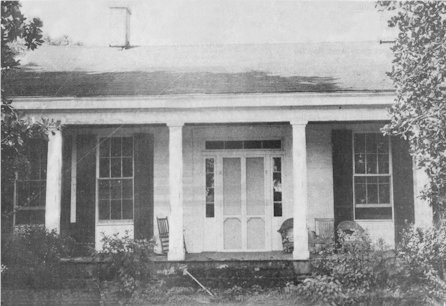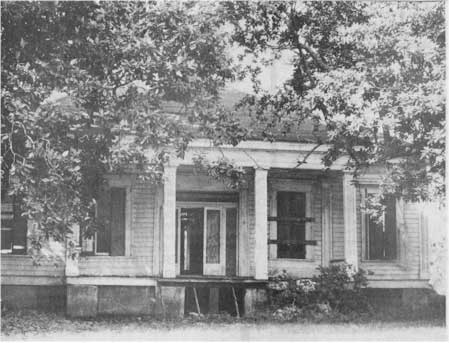|
Edwards: A History A series on the
history of Edwards by Rebecca B. Drake,
The Champion Plantation was lost to history when it was burned to the ground by Union soldiers around July 7, 1863. Two neighboring plantations, now known as the Coker House and Hiawatha, were also used as hospitals for wounded soldiers and are still standing today. Both of these antebellum homes are located within half a mile apart, on highway 467, just outside Edwards. Large magnolia trees frame the entrance to both homes and provide the perfect atmosphere for day dreaming - and - for thinking back to the days of the war.
During the Civil War, the plantation was owned by Charles R. Yeiser who purchased the property in 1859 from Charles Allen and Hamilton Wright. After the Battle of Champion Hill the home served as a hospital for wounded Confederate soldiers. A letter, written by Elizabeth (Bettye) Gervin Ray, whose family once occupied the neighboring Coker House, briefly mentions Hiawatha... "someone wrote a piece for the Campe Chase Gazette claiming the Coker House is the only existing Civil War structure in the area. No way! The Floyd's plantation - Hiawatha - is far older and was already an established plantation when Mr. Coker built 'Greenwood' for his wife." In 1859, four years before the war, the property was sold to William Smith and Charles Yeiser. Some people in Edwards still refer to the home as The Yeiser House because it was in their possession for twenty years. In 1889, the plantation was purchased by Mr. A. J. Lewis, a citizen of Edwards and the first millionaire of Hinds County. The other antebellum house the Coker House, known by locals as "Greenwood" is located at the entrance of the Adam's Egg Farm (Cal-Maine Foods). It has the same architectural features as Hiawatha, but the front entrance is framed with large cedar trees, as well as magnolias. The house is located on a large section of plantation land that was, in earlier days, owned by Dr. Jessie Cotton and Dr. John Cotton. When the news of the California Gold Rush reached Edwards in 1849, Dr. John Cotton and Alfred Askew abandoned their families and set out together to 'pan for gold'. In route John Cotton died, leaving Mrs. Cotton a widow with five children. H. B. Coker, a prominent citizen of Edwards, married Mrs. Cotton and moved to the plantation. Mr. Coker, however, refused to "live under another man's roof", so he built his bride a new house. This house became known as the Coker House or, as the family lovingly called it, 'Greenwood Plantation'.
After the Battle of Champion Hill, the Coker House was used by the Union army as a hospital. The walls, inside and out, still show scars of the war, especially those made by cannon balls and bullets. A stone monument, just across the street, marks the spot where Confederate General Tilghman was killed in battle. Around the turn of the century the house was occupied by Coker's daughter and her husband, S. E. Thomas of Edwards. In 1932, after Mrs. Thomas had been left a widow, the plantation was sold to Mr. and Mrs. Alfred Gervin and it remained in their possession for thirty-one years. "Those were happy years"... commented Mrs. Louise Gervin Windham, one of the Gervin's seven children raised at Greenwood. "I have so many happy memories from the years that our family lived there. Christmas was especially a happy time on the plantation. My father's hostler would choose a 12-foot tree and set it tip in the middle of the front part of the hall. The lights that went on the tree were as big as light bulbs! My father loved Christmas." While reminiscing about the old house Louise also commented, "I'm always grateful that I was able to live in an old and historic house like Greenwood. And, I'm especially happy that my children have such good memories of how people lived back in the days of the old south." After the death of Mr. and Mrs. Gervin and the settling of their estate, the property was sold in 1963 to Fred Adams Jr., and became a part of the Adams Egg Farm. Just recently, with the hope of restoring 'Greenwood' and preserving its history, the house and five acres of land was given by the Adam's family to the Jackson Civil War Roundtable. Both homes are barely visible from the road because the large magnolias - well over 150 years old - are overshadowing. Probably, during the war, the trees were just saplings. Now, they stand in stately elegance - as if to attest not only to the passage of time but to the beauty of the homes resting in their shade. Postscript on the houses added in 2006; During Decemember of 2005, Hiawatha was moved by Bobby and Peggy DeLaughter to Cooper's Wells Street in Raymond where it will be restored to its original splendor. The new site of the house adjacent to the historic Raymond Confederate Cemetery and Alston Springs where Gregg's Brigade camped the night before battle. The Coker House, property of the Jackson Civil War Roundtable and later the Mississippi Archives and History, has now fallen into total ruins. It's fate is unknown.
| ||||
|
| Home | Grant's March | Pemberton's March | Battle of Champion Hill | Order of Battle | Diaries & Accounts | Official Records | | History | Re-enactments | Book Store | Battlefield Tour | Visitors | Copyright (c) James and Rebecca Drake, 1998 - 2002. All Rights Reserved. |

